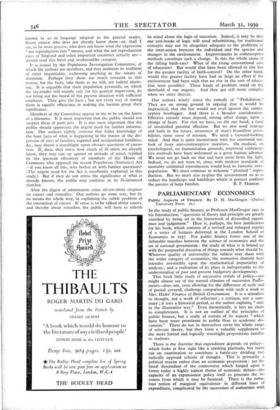PLANNING SURVIVAL
Population and Fertility. By D. V. Glass and C. P. Blacker. (The Population Investigation Committee. 3s.)
THE population question may be recommended as an excellent anodyne for the crisis-vexed mind. By comparison with the figures with which it is concerned and the vast changes fore- shadowed, even the major calamity of a modern world war shrinks into a thing of small account. The deadliest weapon' of attack, however pessimistic a view one takes of them, car- have but a trifling effect on. racial survival compared with that of the modern attitude towards family limitation.
Like metaphysics, population study whisks us away to a great eminence, from which our current quarrels and contend- ing ideologies seem but little ripples on the tide of huma-1 affairs. But unlike metaphysics, it is concerned with par- ticular facts, with matters of everyday human interest—wit! the motor-car, the one-roomed flat, social ambition, and th craze for banting. It is these much more than the stupiditie of our leaders of the Right or the Left that are shaping ou' destiny.
In Population and Fertility Mr. Glass and Dr. Blacker gi‘ an outline of such facts about the present situation as ar
known to us in language adapted to the general reader. Every citizen who does not already know them—or, shall I say, to be more precise, who does not know what the expression " net reproduction rate " means, and what the net reproduction rates of England and other important countries actually are— should read this brief and workmanlike synopsis.
It is issued by the Population Investigation Committee, of which the authors are members, and they maintain its tradition of strict impartiality, eschewing anything in the nature of alarmism. Perhaps they show too much restraint in this matter, for the facts, take them as we will, are indeed alarm- ing. It is arguable that their population pyramids, on which the lay-reader will mainly rely for his general impression, do not bring out the moral of the present situation with sufficient emphasis. They give the facts ; but not every way of stating them is equally efficacious in making the layman grasp their significance.
Members of the Committee appear to me to be on the horns of a dilemma. It is most important that the public should not suspect them of parti pris. It is also most important that the public should appreciate the urgent need for further informa- tion. Our authors rightly contend that fuller knowledge of the bare facts of what is happening in the matter of the dis- persion of sizes of families, regional and occupational fertilities, &c., may throw a searchlight upon obscure questions of causa- tion. If, then, they stress how much of ill omen we already know, they may run up against an attitude of mind, typified by the ignorant effrontery of members of the House of Commons who opposed the recent Population (Statistics) Act —if you know all this, why bother us with further questions? (The urgent need for the Act is excellently explained in this study.) But if they do not stress the significance of what is already known, the public may continue in its ill-informed slumber.
After the digest of information come all-too-short chapters on causes and remedies. Our authors go some way, but by no means the whole way, in explaining the subtle problem of the interaction of causes. If sense is to be talked about causes, and thereby about remedies, the public will have to refresh its mind about the logic of causation. Indeed, it may be that our text-books of logic will need refurbishing, for traditional concepts may not be altogether adequate to the problems of the inter-action between the individual and the species and changes in the environment. Improvements in contraceptive methods constitute such a change. Is this the whole cause of the falling birth-rate? What of the rising conventional cost of education? But would that have been allowed to rise but for the greater facility of birth-control? On the other hand, would this greater facility have had so large an effect if the environment had been such that no rise in the cost of educa- tion were possible? These kinds of problem stand on the threshold of our inquiry. And they get still more complex when we enter therein.
Our authors wisely reject the remedy of " Prohibition." They are on strong ground in arguing that it would be impractical, that the law would not avail against the contra- ceptive bootlegger. And there is a broader consideration. Effective remedy must depend, among other things, upon a change of heart. For that we have, on the one hand, a fund of unsatisfied parental affection. But we also need courage and faith in the future, awareness of man's boundless possi- bilities, some sense of mission. We need a forward-looking mind. And that is quite inconsistent with the emotional out- look of fusty anti-contraceptive moralists. On medical, on psychological, on humanitarian grounds, improved contracep- tive methods have been welcomed as a great human advance. We must not go back on that and turn away from the light. Indeed, we do not want to, since with modern standards of mortality unlimited reproduction would lead to fantastic over- population. We must continue to welcome " planned " repro- duction. But we must also re-plan the environment so as to reduce the handicaps and hardships which at present confront



































































 Previous page
Previous page